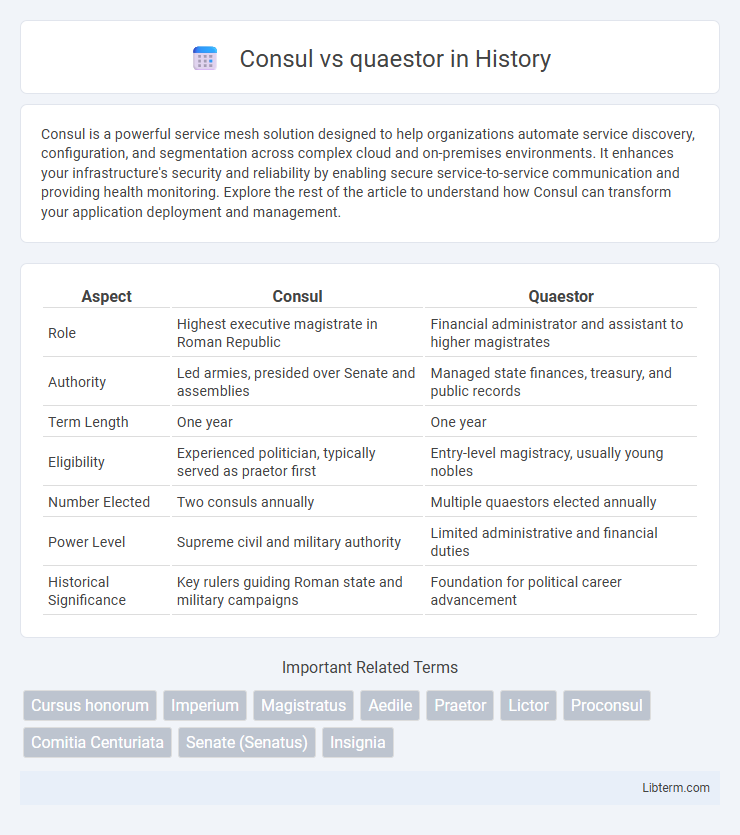Consul is a powerful service mesh solution designed to help organizations automate service discovery, configuration, and segmentation across complex cloud and on-premises environments. It enhances your infrastructure's security and reliability by enabling secure service-to-service communication and providing health monitoring. Explore the rest of the article to understand how Consul can transform your application deployment and management.
Table of Comparison
| Aspect | Consul | Quaestor |
|---|---|---|
| Role | Highest executive magistrate in Roman Republic | Financial administrator and assistant to higher magistrates |
| Authority | Led armies, presided over Senate and assemblies | Managed state finances, treasury, and public records |
| Term Length | One year | One year |
| Eligibility | Experienced politician, typically served as praetor first | Entry-level magistracy, usually young nobles |
| Number Elected | Two consuls annually | Multiple quaestors elected annually |
| Power Level | Supreme civil and military authority | Limited administrative and financial duties |
| Historical Significance | Key rulers guiding Roman state and military campaigns | Foundation for political career advancement |
Introduction to Consuls and Quaestors
Consuls were the highest-ranking elected officials in the Roman Republic, responsible for commanding the army, presiding over the Senate, and executing government decisions. Quaestors served as financial administrators, managing the treasury and overseeing state funds, often acting as junior officials under consuls or provincial governors. Both positions were integral to Roman governance, with consuls holding executive power and quaestors providing essential fiscal support.
Historical Context and Origins
The consul was the highest elected political office in the Roman Republic, originating in 509 BCE after the overthrow of the Roman monarchy, symbolizing the establishment of a republic government. Quaestors, emerging around 409 BCE, were among the earliest magistrates responsible for financial administration, reflecting the growing complexity of Rome's political system. The distinction between consuls and quaestors highlights Rome's evolving institutional framework, balancing military command with administrative duties.
Definition and Core Duties
A consul was one of the highest-ranking elected officials in the Roman Republic, serving as the chief executive authority responsible for leading the government, commanding the army, and presiding over the Senate and assemblies. Quaestors were junior magistrates tasked primarily with financial administration, including managing public funds, overseeing the treasury, and handling fiscal records. While consuls wielded broad political and military power, quaestors provided essential support by managing Rome's financial operations and ensuring accountability in public expenditures.
Eligibility and Selection Process
Consuls in ancient Rome were elected by the Centuriate Assembly, requiring candidates to have held prior magistracies such as quaestor, with a minimum age of 42 and a completed cursus honorum. Quaestors were selected either by election within the Tribal Assembly or by appointment, typically marking the first step in a political career with a minimum age of about 30. The selection process for consuls emphasized seniority and political experience, while quaestor elections focused on entry-level eligibility for administrative duties.
Powers and Jurisdiction
Consuls held the highest executive authority in the Roman Republic, commanding the army, presiding over the Senate and assemblies, and exercising imperium across the entire state, including the power to convene and veto decisions. Quaestors, by contrast, primarily managed financial affairs, overseeing the treasury and military supplies, with jurisdiction limited to fiscal matters and subordinate to higher magistrates. While consuls possessed broad political and military powers, quaestors operated mainly as administrative officials with restricted legal authority and no imperium.
Role in Roman Political Structure
Consuls were the highest-ranking elected officials in the Roman Republic, responsible for leading the government and commanding armies, symbolizing supreme civil and military authority. Quaestors held financial and administrative roles, managing the state treasury and assisting higher magistrates, serving as the entry-level position in the cursus honorum political ladder. While consuls wielded extensive executive power, quaestors primarily focused on fiscal duties and logistical support within the Roman political structure.
Differences in Authority and Influence
Consuls held the highest executive authority in the Roman Republic, commanding the army, presiding over the Senate, and enforcing laws with imperium powers. Quaestors possessed limited financial responsibilities, managing the state treasury and assisting higher magistrates without military command. Consuls wielded significant political influence through legislative and military roles, while quaestors served primarily as administrative officials with minimal independent authority.
Evolution of the Offices Over Time
The offices of consul and quaestor evolved significantly from the Roman Republic through the Empire, with consuls originally holding supreme executive authority and military command, while quaestors managed financial administration and treasury duties. Over time, the consulship became largely ceremonial under the Empire, losing much of its political power, whereas the quaestorship transformed into a preliminary step for aspiring senators, maintaining its role in financial oversight but with diminished autonomy. This shift reflects the broader centralization of imperial power, reducing the republican magistracies to symbolic or bureaucratic functions.
Notable Consuls and Quaestors in History
Notable consuls like Gaius Julius Caesar and Marcus Tullius Cicero played pivotal roles in shaping Roman political and military history, commanding armies and directing state affairs. Quaestors such as Publius Clodius Pulcher managed financial administration, marking the early steps of influential Roman political careers. The consulship represented the highest elected office with substantial authority, while the quaestorship served as an essential entry point into the cursus honorum, the sequential order of public offices.
Conclusion: Impact on Roman Governance
The consul held supreme executive authority, shaping military strategy and civil administration, which ensured centralized decision-making in Roman governance. Quaestors managed financial affairs and resource allocation, providing critical support that maintained fiscal stability and administrative efficiency. Together, consuls and quaestors established a balanced power dynamic that underpinned Rome's political structure and sustained its expansive governance system.
Consul Infographic

 libterm.com
libterm.com